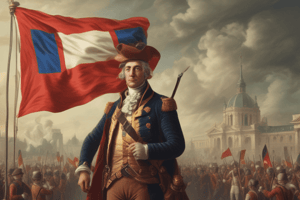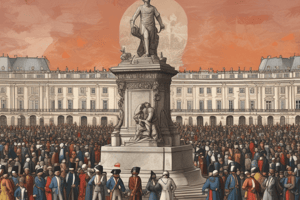Podcast
Questions and Answers
What type of government did the French have at the outset of revolution?
What type of government did the French have at the outset of revolution?
Absolute monarchy, the king had power.
How did the government deny people rights?
How did the government deny people rights?
The French people had no freedom of speech or press, and little freedom of religion.
How was the French judicial system different from ours?
How was the French judicial system different from ours?
The French people were thrown in jail, considered guilty until they proved their innocence.
What changed socially by the 1700s?
What changed socially by the 1700s?
Who were the bourgeoisie?
Who were the bourgeoisie?
How did the upper classes view the bourgeoisie?
How did the upper classes view the bourgeoisie?
Why were the bourgeoisie unhappy?
Why were the bourgeoisie unhappy?
Why had the economic mood in France become revolutionary?
Why had the economic mood in France become revolutionary?
Why might a French peasant justifiably argue that the land distribution was unfair?
Why might a French peasant justifiably argue that the land distribution was unfair?
Why was the French treasury bankrupt?
Why was the French treasury bankrupt?
What was the last economic straw?
What was the last economic straw?
How did the Enlightenment contribute to the revolutionary mood in France?
How did the Enlightenment contribute to the revolutionary mood in France?
How did the writing impact the bourgeoisie?
How did the writing impact the bourgeoisie?
Flashcards
French Absolute Monarchy
French Absolute Monarchy
The king held absolute power with minimal checks or balances.
French Rights Denial
French Rights Denial
Citizens lacked fundamental rights like freedom of speech, press, and religion.
Presumption of Guilt
Presumption of Guilt
The judicial system presumed guilt; individuals were imprisoned without proof of guilt.
Bourgeoisie Definition
Bourgeoisie Definition
Signup and view all the flashcards
Bourgeoisie Frustration
Bourgeoisie Frustration
Signup and view all the flashcards
Economic Desperation
Economic Desperation
Signup and view all the flashcards
Land Distribution Inequity
Land Distribution Inequity
Signup and view all the flashcards
French Treasury Bankruptcy
French Treasury Bankruptcy
Signup and view all the flashcards
Famine of 1788-89
Famine of 1788-89
Signup and view all the flashcards
Enlightenment Influence
Enlightenment Influence
Signup and view all the flashcards
Bourgeoisie Questioning
Bourgeoisie Questioning
Signup and view all the flashcards
Study Notes
French Government at the Outset of Revolution
- Absolute monarchy characterized the French government; the king held significant power.
Denial of Rights
- French citizens faced severe restrictions, lacking freedom of speech, press, and having limited religious freedom.
Judicial System
- The French judicial approach presumed guilt; individuals could be imprisoned without proving innocence.
Social Changes by the 1700s
- The middle class, known as bourgeoisie, grew in the 1700s, becoming wealthy and educated, creating a noticeable social shift.
Definition of Bourgeoisie
- Bourgeoisie consisted of educated townspeople, including lawyers, bankers, educators, merchants, and doctors, forming the wealthy middle class.
Upper Class Views on Bourgeoisie
- The upper class regarded the bourgeoisie as "dirty tradesmen" and prohibited intermarriage with them.
Unhappiness of the Bourgeoisie
- Despite sometimes surpassing nobles in wealth, the bourgeoisie felt frustrated as they were barred from upper-class status.
Revolutionary Economic Mood
- Economic disparity widened, leading to desperation among common people struggling to feed their families.
Land Distribution Inequity
- A small number of nobles owned approximately 50% of the land, leading to justifiable grievance among French peasants regarding land distribution.
Bankruptcy of the French Treasury
- The treasury became bankrupt due to expenses from foreign wars, financial aid to America, and the extravagant lifestyle of the king, with nobles contributing nothing in taxes.
Last Economic Straw
- The famine of 1788-89 exacerbated the situation; bread became scarce and expensive, fueling public discontent.
Influence of the Enlightenment
- Enlightenment writings criticized the French government, contributing significantly to the revolutionary mood.
Impact on the Bourgeoisie
- Educated members of the bourgeoisie engaged with Enlightenment ideas, questioning their lack of rights, freedoms, and representation in government.
Studying That Suits You
Use AI to generate personalized quizzes and flashcards to suit your learning preferences.





